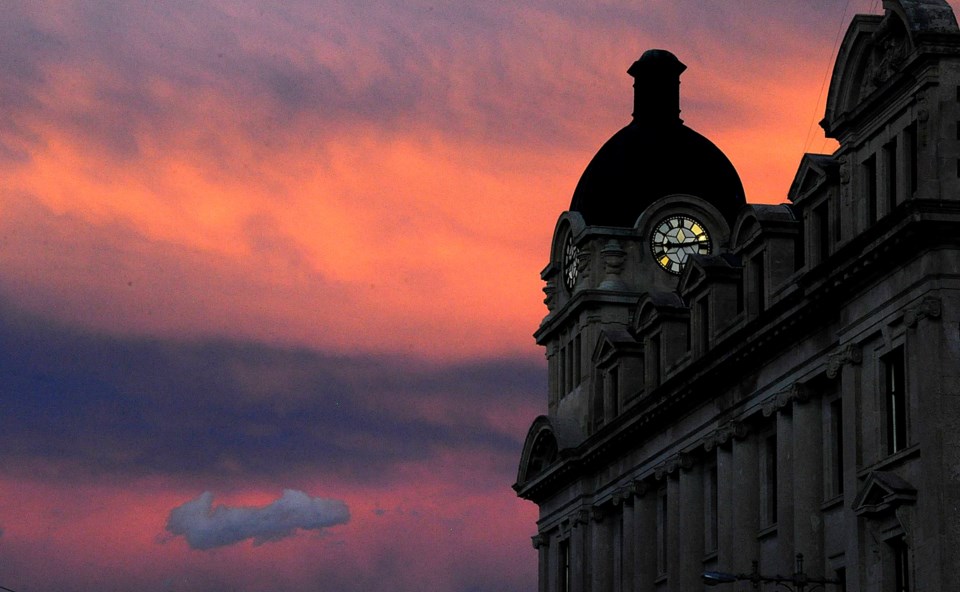MOOSE JAW — With Moose Jaw’s stormwater infrastructure in “dire need” of repairs, city council has decided to impose one fee on all property classes to pay for the upgrades.
During its Feb. 10 executive committee meeting, council voted 5-2 to adopt a flat rate for the newly created stormwater utility by charging all customers $9.80 per month — or $117.60 annually — per property, regardless of lot size.
Councillors Chris Warren and Carla Delaurier were opposed.
The recommendation becomes official when council approves the meeting minutes during its Feb. 24 regular meeting.
City hall expects to generate roughly $1.6 million annually — $1.275 million for capital project expenses and $325,000 for operating expenses — from these fees, based on 13,701 total properties, a council report said.
The fees this year begin on Tuesday, July 1, so property owners will pay half the amount, while they will start paying the full amount next year, the report continued. Meanwhile, in 2026, the mill rate should decrease by 0.84 per cent because the operating costs will transfer from the main budget to the stormwater utility.
Besides this fee structure, city administration presented other options, including:
- Fees based on the size of the lot and how much stormwater it generated
- A two-rate fee structure for properties under 2,000 square metres — primarily residential — and a different rate for commercial, industrial and institutional
- Two different rates where residential properties paid a little more to alleviate the burden on commercial/industrial properties
Flat rate is unfair
Warren agreed with creating the utility and finding a sustainable funding source, but he opposed the flat rate and wanted larger properties to pay more for the stormwater they generated since that was fairer.
He understood that commercial properties were paying 1.8 times what residential ones paid but noted that was because of assessment values. He also noted that commercial owners pay a higher tax ratio because they can collect income from tenants and pass along costs to customers.
“When I think about a flat rate for over 12,000 homes, I think that there are a lot of homeowners that don’t have that ability — especially those on fixed income — to raise that type of income,” Warren continued.
He added that all property owners will pay almost $120 extra with this fee, which is more than the $100 cast iron infrastructure levy and $65 parks and recreation infrastructure levy.
‘Dire need’ for repairs
Approving the utility’s creation and its related fees is a “real tough decision” because it affects all property owners, said Coun. Jamey Logan. For example, commercial owners are already burdened with higher taxes, and just because they’re commercial doesn’t mean they’re “flush with money.”
“So I think adding this cost to businesses would be a detriment to the city at this point, so maybe we change it at a later point … ,” he continued. But we can’t keep kicking these (infrastructure repairs) down the road.”
Logan also hoped administration posted online photos and reports showing the crumbling above- and belowground stormwater infrastructure and “the dire need” to repair it, since it would explain that council wasn’t looking to spend money frivolously and wanted to protect homes and businesses.
“It is dire,” agreed Mayor James Murdock, noting that this is one step to improving Crescent Park’s Serpentine Creek and returning it to its previous condition.
A competitive industry
In its report, administration said that only Regina, Saskatoon and Lloydminster have stormwater utility fees, with each charging for single-family properties and commercial properties over 15,000 square feet.
Lloydminster charges $16.94 per month and $223.59 per month, respectively; Regina charges $20.38 per month and $285.31 per month, respectively; and Saskatoon charges $8.90 per month and $403.02 per month, respectively.
Coun. Patrick Boyle said that these statistics made him focus on the competitiveness in Moose Jaw’s commercial sector and how $9.80 per month kept Moose Jaw competitive with those cities.
He preferred the flat rate to keep the industry competitive and promote future growth, while conversely, he noted that it put Moose Jaw at a disadvantage compared to Swift Current and Prince Albert.
Meanwhile, Boyle said the cost of not repairing the stormwater infrastructure now would cost residents more later and likely be $20 per month instead of $9.80. He pointed to the success of the cast iron replacement program, where the city went from spending millions of dollars to repair 150 water pipe breaks annually to spending much less to repair roughly 40 breaks annually.
Looking into the future
“I agree wholeheartedly that this is not something we’re taking … lightly. The key is that there’s important infrastructure projects that we can no longer allow to just be ignored,” said Coun. Dawn Luhning.
She agreed with the flat rate and not putting a heavier financial burden on commercial properties, while she thought council and administration should be looking 10 to 20 years down the road in planning stormwater upgrade projects since this infrastructure was crucial for residents’ quality of life.
Luhning’s only concern was taxpayers would be paying almost $30 more on their utility bills after three months, which “isn’t insignificant.”
Transparency and accountability
Coun. Heather Eby said this comes down to transparency and accountability, including transparency about how critical repairs are needed to address underground pipes. She reminded council that three rotting pieces of wood are holding up a culvert in the city, based on pictures administration has presented.
She added that this utility will make a difference during this council’s term and over the next decade, and while she didn’t like charging citizens more taxes, she was “very happy” that they were taking care of this issue.
The next regular council meeting is Monday, Feb. 24.




